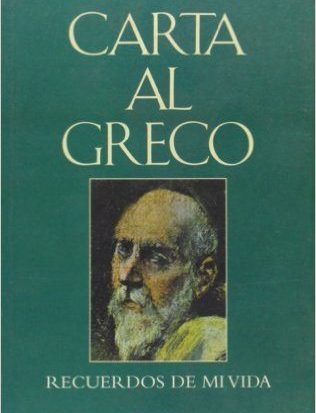
By Alex Vavoulis
Spain by Nikos Kazantzakis (translated by Amy Mims). Ditros, Athens, 1957; English edition, Simon and Schuster, 1963.
Nikos Kazantzakis is one of the great literary figures of the 20th century. When you read his prose and poetry, you realize that he is not only a creative writer but also someone who understands the human condition. He has mastered the art of living, which according to Carl Jung few people ever reach.
He was endowed with the “spirit of life” and we, the readers of his books, are its beneficiaries. For example, in his first chapter, “On Entering Spain,” the author invites your attention with the following words:
Spain has two faces. The elongated fiery visage of the Knight of the Woeful Countenance; and its other, the practical head of Sancho.
And then:
All Spain flooded with light, stirring inside my mind like a male peacock, its wings widespread, slowly strutting between two seas.
In the first part of the book, the author takes the reader through various cities and towns in the west part of Spain and provides interesting commentaries as he reflects on the culture and its inhabitants. For example, in the town of Burgos, he says:
I went back to the uphill streets and walked along the bank of the yellow-green river. For a moment the setting sun comes into sight among the clouds. Sparkling light on the people’s faces.
The next stop was Valladolid, the heart of Castile, and then Avila. The author becomes philosophical as he ruminates about the human condition:
Only through faith can the masses be elevated. What do we mean by being elevated? We mean the subjection of their desires and their needs…to the deepest human rhythm…the transmuting as much material substance as possible to spirit.
When the author reaches Toledo, he writes the following:
Toledo lived in my mind just as El Greco had painted it in the storm: towering, asceti c, scourged by sudden flashes of light, with the arrow of her marvelous Gothic Cathedral like the arrow of the human soul piercing God’s thunder-laden clouds.
In his describing Toledo, Kazantzakis has much more to say about his fellow Cretan El Greco (Dominicos Theotokopoulos).
Before leaving Spain, Kazantzakis retraces his steps and returns to Toledo, Madrid and other places and then goes into great detail as he puts on his reporter’s hat and tells of the horrors of the civil war and the devastation it has brought to Spain; it is brother killing brother, and Toledo and Madrid and other cities have been decimated by the air attacks of the fascistic government of Francisco Franco.
The importance of the themes discussed by Kazantzakis cannot be overemphasized, and they are as relevant today as they were in the 1930s. The English edition is greatly enhanced with the superb translation by Mims, author of 12 books and a translator of Kazantzakis and the poet Yannis Ritsos.
*****
Alex Vavoulis is professor emeritus in chemistry at Fresno State. He is an honorary board member of The Sword of Zeus Project and the founder of listener-sponsored radio station KFCF-FM in Fresno.
